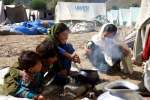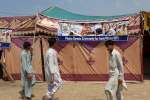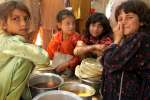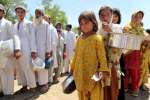Nearly 100 Pakistani refugees freed from detention in Bangkok
News Stories, 6 June 2011
BANGKOK, Thailand, June 6 (UNHCR) – Even though he's 35, Monday felt like the first day of his life for Pakistani refugee Tahir Mehmood. He was released after six months in an immigration detention centre in the Thai capital along with 93 other refugees, locked up merely for being refugees.
"It's like a new-born baby," said the former Ahmadi religious leader, a member of an oft-persecuted religious minority in Pakistan. "It's like a bird being released from a cage and flying free. I don't have enough words to express our feelings. You can just see them on our faces."
Smiling, a bit dazed, or crying with relief, the 94 Ahmadi refugees and two asylum-seekers – detained in police raids between last December and this February – were released on bail posted by a Thai refugee advocacy group. They included 34 children under the age of 12, one of whom was born in detention.
The release, under the umbrella of the Asia Pacific Refugee Rights Network, was spearheaded by the National Human Rights Commission of Thailand and the Thai Committee for Refugees.
"The UN refugee agency believes no refugee should be locked up simply for being a refugee, so we applaud any measure that gets refugees out from behind bars," said James Lynch, UNHCR's Representative for Thailand. "At the same time, we continue to work with the Thai government to prevent refugees from being arbitrarily rounded up and sent to detention centres."
Mehmood said he regretted the damage the time behind bars had done to his family. His two older sons, eight and six, were with him in a cell with 100 other men while his youngest son, not quite two, was with his wife in a cell packed with 300 women. They were able to meet as a family only once or twice a month.
Despite the hardships, he maintained an astonishingly optimistic attitude, grateful to UNHCR and other agencies for health care and the sporadic education his sons received.
"What can I say? Only 'thank you'," he said shortly before his release. He also credited Allah, his faith and the refugees' patience for bringing them all through detention in good spirits.
"Love for all, hatred for none, that is what our religion teaches," he said. "Whatever the situation, you should always hold onto your ethics and obey the officials wherever you are. That is what we tried to do inside this detention centre."
Mehmood also thanked UNHCR for fast-tracking the group's resettlement applications. Resettlement is one of the ways recognized refugees can be freed from immigration detention centres in Thailand.
The UN refugee agency has submitted the 94 refugees for resettlement in third countries, under one of the world's largest resettlement programs, which has seen more than 70,000 refugees leave Thailand to start new lives since 2005.
Besides posting bail, detainees (not only refugees) can be freed from detention in Thailand by deportation to the home country or travel to a third country, with the detainee paying the expenses in either case.
UNHCR's Lynch welcomed the initiative of Thai civil society to protect the rights of refugees. "We are glad to see Thai society rallying to protect refugees, who – having fled persecution in their homelands -- are among the most vulnerable people in this country," he said.
Because Thailand does not have a national refugee law, all foreigners who enter or live in Thailand without proper documentation are subject to arrest, prosecution, detention and deportation under immigration laws, even if they are registered with UNHCR as asylum-seekers or refugees.
By Kitty McKinsey
In Bangkok, Thailand
















































